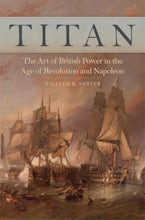- Home
- history
- political science
- Titan
Titan
The Art of British Power in the Age of Revolution and Napoleon
Published by: University of Oklahoma Press
Imprint: University of Oklahoma Press
424 Pages | 6 x 9 | 13 b&w illus., 7 maps, 4 table
$34.95
$29.95
When the leaders of the French Revolution executed Louis XVI and Marie Antoinette in 1793, they sent a chilling message to the hereditary ruling orders in Europe. Believing that monarchy anywhere presented a threat to democratic rule in France, the leaders of the revolution declared war on European aristocracies, including those of Great Britain. For more than twenty years thereafter, France and England waged a protracted war that ended in British victory. In Titan, William R. Nester offers a deeply informed and thoroughly fascinating narrative of how England accomplished this remarkable feat.
Between 1789 and 1815, British leaders devised, funded, and led seven coalitions against the revolutionary and Napoleonic governments of France. In each enterprise, statesmen and generals searched for order amid a complex welter of bureaucratic, political, economic, psychological, technological, and international forces. Nester combines biographies of great men—the likes of William Pitt, Horatio Nelson, and Arthur Wellesley—with an explanation of the critical decisions they made in Britain’s struggle for power and his own keen analysis of the forces that operated beyond their control. Their efforts would eventually crush France and Napoleon and establish a system of European power relations that prevented a world war for nearly a century.
The interplay of individuals and events, the importance of conjunctures and contingency, the significance of Britain's island character and resources: all come into play in Nester's exploration of the art of British military diplomacy. The result is a comprehensive and insightful account of the endeavors of statesmen and generals to master the art of power in a complex battle for empire.
William Nester is the acclaimed author of more than thirty books on international relations, military history, and the nature of power, including The French and Indian War and the Conquest of New France and the award-winning George Rogers Clark: “I Glory in War.”
"In Titan, William R. Nester offers a compelling and comprehensive account of a turbulent period in the development of Britain as a great power, a period that shaped the early decades of American history."—Jeremy Black, author of Fighting for America: The Struggle for Mastery in North America, 1519–1871
“Between 1793 and 1815 Britain was Napoleonic France's most consistent adversary. British armies triumphed over their French foes in battle after battle, while the Royal Navy ensured that Britannia ruled the waves. In this lively and accessible account, William R. Nester tells the story of what remained the greatest war effort in British history until the total conflicts of the twentieth century.”—Charles J. Esdaile, author of Napoleon’s Wars: An International History
"William R. Nester's masterful chronicle provides meaningful insight into the development and exercise of British power in the era of the modern nation-state. But the book is also about people--men who wrestled with the circumstances of the times and strove to overcome their own weaknesses in order to determine the fates of whole populations. This is grand history at its finest.”—Edward G. Lengel, author of To Conquer Hell: The Meuse-Argonne, 1918












